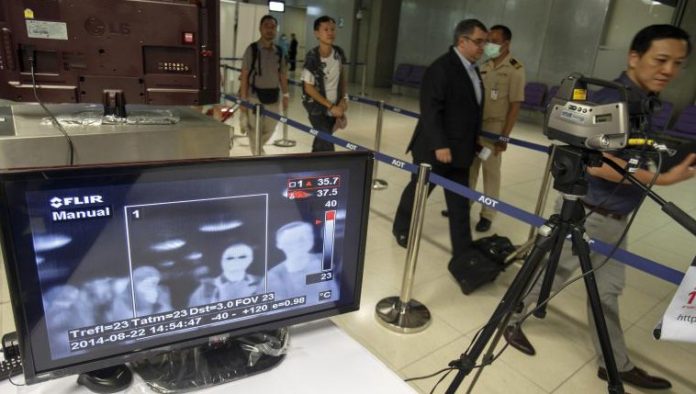
Above, passengers are screened with touch-free thermometers before boarding an international flight.
Following the death of the first US Ebola patient in Dallas, TX, officials at the U.S. Centers for Disease Control and Prevention are enhancing Ebola screening at five US airports that receive nearly 95% of West African travelers.
These airports include: New York’s JFK, Washington-Dulles, Newark, Chicago-O’Hare, and Atlanta international airports. While JFK International Airport will begin the new screening this Saturday, the others are set for implementation next week.
The Centers for Disease Control and Prevention (CDC) is working with the Department of Homeland Security’s Customs & Border Protection (CBP) “to continuously increase the safety of Americans,” says CDC Director Dr. Tom Frieden.
The CDC has been working with airlines, airports, ministries of health and other partners since the beginning of August to provide assistance for developing exit screening and travel restrictions in countries affected by Ebola.
As part of the enhanced screening in the US, after passport review, all travelers from Guinea, Liberia and Sierra Leone who arrive at one of the five airports will be escorted by CBP to a separate screening area.
There, trained CBP staff will assess the passengers for signs of illness and will ask them health and exposure questions, as well as provide Ebola health information and reminders about monitoring themselves for symptoms. Additionally, medical staff will take their temperature with non-contact thermometers.
If the travelers show any signs of possible Ebola exposure, a CDC quarantine station public health officer will evaluate them by taking additional temperature readings and making a public health assessment. If the travelers need additional evaluation or monitoring after this assessment, they will be referred to a public health authority.
Those who have neither symptoms nor a known history of exposure will simply receive health information for self-monitoring.
‘We can’t make US Ebola risk zero’
The CDC notes that all outbound passengers are already screened for Ebola symptoms in the affected West African countries, which involves a travel health questionnaire, a visual assessment and body temperature measurements.
Since the screening began during the last 2 months in Guinea, Liberia and Sierra Leone, 77 out of 36,000 travelers were denied boarding a flight. However, none of these 77 passengers were diagnosed with Ebola; many were diagnosed with malaria, a common disease in West Africa that is not contagious from person to person.
At a press conference yesterday, when asked about critics’ calls to ban all travel to and from West Africa, Dr. Frieden responded:
“The problem with that approach is that it makes it extremely difficult to respond to the outbreak. It makes it hard to get health workers in because they can’t get out. If we make it harder to respond to the outbreak in West Africa, it will spread not only in those three countries but to other parts of Africa and will ultimately increase the risk here. That’s why the concept of, above all, doing no harm is so important.”
As Dr. Frieden and other leading health officials have pointed out, travel bans are often counterproductive in these situations because they restrict the flow of vital resources and personnel that are needed to stop the outbreak. The risk of additional Ebola cases in the United States will remain real as long as the outbreak is raging in West Africa, where the disease has killed more than 3,800 people and infected nearly double that many, experts say.
“We’ve been very clear that as long as Ebola continues to spread in Africa, we can’t make the risk zero here,” added Dr. Frieden.
Ebola is a rare, deadly disease caused by infection with one of the Ebola virus strains. It is spread through direct contact (i.e. through broken skin or mucous membranes) with infected blood, bodily fluids, objects or animals. It is not spread, however, through the air, water or by food.
Additional measures in place for remains of Dallas patient
On October 1st, the CDC confirmed the first domestic case of Ebola in the US, in a patient who traveled between Liberia and Dallas, TX. Sadly, that patient died yesterday.
At yesterday’s press briefing, Dr. Frieden was asked to expand on the guidelines of handling human remains of Ebola patients and whether the CDC will be playing a role with the Dallas patient.
“Yes. As in Africa […] the handling of individuals who have passed away from Ebola is a very high-risk procedure,” said Dr. Frieden, adding:
”The way Ebola works is, if you’re exposed but not sick, you have no ability to pass it on to others. As you begin to get sick […] you may be able to pass to others, and the sicker you get, the higher the amount of virus in your body. When someone dies from it, there are large quantities of virus.”
He explained that the CDC has worked closely with authorities in Texas to “ensure that respectfully and with the ability of the family to view the body, the patient who died earlier today, his human remains will be safely removed and safely handled so that they will not present a risk to anyone in the family, to anyone in the health care system, or to anyone who’s participating in the process of burial.”
Speaking about the ramped up airport security efforts, Secretary of Homeland Security Jeh Johnson says that the “CBP, working closely with CDC, will continue to assess the risk of the spread of Ebola into the US, and will take additional measures, as necessary, to protect the American people.”
